The difference between a hostel and hotel encompasses design, the range of services and the intended guest experience. For example, hostels prioritize a shared experience with other guests, while hotels offer comfort and privacy. Understanding the difference between a hostel and hotel is important because the two accommodation types have different aims. They are also usually targeted towards different types of guests, with varying budgets.
In this article, you can learn all about how hostels and hotels differ and gain an understanding of how these differences impact the guest experience, the services on offer and the ideal strategies for success.
Table of Contents:
- Hostel vs. Hotel Explained: Understanding the Differences
- Why the Difference Between a Hostel and Hotel Matters
- 5 Key Differences Between a Hostel and Hotel
- 5 Differences Between Hostel and Hotel Strategies
- 5 Essential Operation Areas for Hostels and Hotels
- Hostel vs. Hotel: Factors to Consider When Choosing Between Them
- Critical Elements for Hostel and Hotel Success
- A Comprehensive Guide to Hostels
- Exploring Different Types of Hotel
Hostel vs. Hotel Explained: Understanding the Differences
The difference between a hostel and a hotel lies primarily in their operational approaches. A hostel provides guests with a shared living space and communal feel, while a hotel offers guests their own room and more ancillary services.
Most hostels will provide guests with a bed and shared facilities, including kitchen and bathroom facilities. Hotels will usually provide a room with an en suite bathroom, along with on-site meal options and room service.
Any useful comparison of hostel and hotel business models must also consider the target audience. Most hostels offer a budget-friendly experience, targeting students, gap year or solo travelers. Hotels are more varied, ranging from budget-friendly hotels, right the way up to luxury hotels targeting the most wealthy travelers.
Why the Difference Between a Hostel and Hotel Matters
In the hotel industry, understanding the difference between a hostel and a hotel is important because it informs everything from marketing to core operations. The two business types require different buildings, facilities, staff and services.
The distinction between hostel and hotel business models plays into guest experiences and expectations too. For instance, guests at a hostel are not expecting the same level of personalized service they might receive at a hotel.
The fundamental differences in approach also impacts areas like recruitment and the size of the workforce. Hotels will usually require a larger and more varied team, with a broader range of skills. Hostels, by comparison, are typically run by much smaller teams, who share responsibilities but have a more narrow focus on basic lodgings.
5 Key Differences Between a Hostel and Hotel
In the sections below, you can explore six of the biggest differences between a hostel and a hotel.
Video: What Is The Difference Between A Hotel And A Youth Hostel? – CountyOffice.org
1. Accommodation and Room Style
A key difference between a hostel and hotel is the overall style of the accommodation and guest rooms. Hotels offer private rooms, with in-room entertainment, while hostels provide a shared living space. Many of the features in a hostel are communal, including bathrooms, the main living space and cooking facilities, whereas hotels provide en suite bathrooms and private facilities within each room.
These differences in approach mean hotels and hostels often appeal to different types of guests. It also impacts the price guests pay, as a hostel will almost always be less expensive than a hotel. Some hostels provide bunk beds, in order to squeeze more guests into the space available. Hotels will usually go further than hostels when it comes to providing entertainment options. The layout differences between hotels and hostels can also have an influence on everything from security to cleaning procedures.
2. Revenue and Business Model
The core approach to gaining revenue is another major difference between a hostel and hotel. Hotels base their revenue generation around selling rooms, whereas hostels make most of their money by selling beds. It is important to understand this distinction, as it can make a difference to marketing and distribution strategy. It also means guests will usually have higher expectations from hotels in terms of extra features.
Hostels will typically make less money per guest, but can maximize occupancy by selling each individual bed in a shared space. Hostels also usually make up for the reduced amount of revenue earned per guest by operating with reduced costs associated with staffing and ancillary services. When exploring how hostels differ from hotels, it is also worth highlighting the more diversified revenue strategies hotels use. While hostels make almost all of their revenue from selling beds, hotels make a lot of their revenue from restaurants, room service, leisure facilities, bars, event hosting and corporate services.
3. Target Market and Guest Demographics
There is a clear difference between a hostel and hotel when it comes to the target market and guest demographics. This ties in with their differing approaches to design, services, and revenue generation. Hotels tend to cater to a combination of business and leisure travelers, including families, groups, and couples. Hostels tend to appeal to social travelers, backpackers, young people and those operating on a tight budget.
This difference in target demographics then influences how the two business types approach marketing and distribution. It affects who they target and where they advertise, but also what features they promote. Hotels often promote their star rating, service quality, and range of amenities. By contrast, hostels will usually place an emphasis on affordability, access to nearby attractions, convenience and the social experience on offer.
4. Amenities and Level of Service
There is also a clear difference between a hostel and hotel when it comes to amenities and the level of service on offer. Hotels try to go above and beyond, whereas hostels aim to cover the basics. A hotel will usually have a front desk, often available 24 hours a day. Hostels will typically provide much more basic assistance and adopt more of a self-service approach to day-to-day living.
Within rooms, hotel guests have a greater sense of personal control. This includes options to change the temperature and manage light levels. In a hostel, the guest experience is much more communal. While a hotel may offer a gym, pools, sports facilities, a restaurant and bar, an on-site shop, and other crucial services, a hostel is unlikely to offer these kinds of extra facilities.
5. Finances and the Initial Investment
Hotels require much more money upfront, because the property will almost always be larger and have more services. Hostels are less expensive to start up and are intended to make maximum use of reduced space. This difference is important because it determines how hotels and hostels are started. A hotel will usually need to have investors or find other ways to raise significant capital, whereas starting a hostel is more affordable.
Hotels need to use more of their space to offer luxury in-room facilities and additional amenities, as hotel guests expect the accommodation to provide for much broader needs and demands. One of the knock-on effects of this difference between a hostel and hotel is the fact that a hostel business is usually easier to start up. Hotels, on the other hand, may require a more significant team effort.
5 Differences Between Hostel and Hotel Strategies
Below, you can learn about some of the key differences between a hostel and a hotel when it comes to strategy.
Video: HOTELS vs HOSTELS
1. Pricing Models
Hotels use a pricing model that focuses on the sale of rooms, regardless of occupancy. Hostels, on the other hand, sell beds, so total occupancy is the major area of focus when it comes to pricing and distribution.
Hotels tend to have greater variation in terms of types of customers: families, business travelers, luxury travelers, and so on. For hostels, each guest is broadly treated the same and charged a very similar price. This difference between a hostel and hotel means hotels may need more dynamic and complex pricing models.
2. Marketing Campaigns
Marketing is important for attracting guests, but there is a clear difference between a hostel and hotel in this area. Hotels will often have a much larger budget and a more sophisticated marketing department. Hostels are able to focus marketing efforts on issues like affordability and the sense of community on offer. Hotels tend to need to highlight issues like cleanliness, innovation, luxury and personalized services.
Hotel marketing is often professional and based on efficiency, while hostels may use more experimental approaches and can focus their efforts on young and budget-conscious travelers.
3. Technology and Innovation
One of the biggest areas of difference between a hostel and hotel is in terms of technology implementation. Hotels are under pressure to provide the latest solutions, whereas hostels can focus more on the basics.
For example, hotels may need to have in-room entertainment, a mobile app, smart room controls, and the latest software. Hostels are primarily offering a place to sleep and meet new people. It should be noted, however, that both face pressure to use the latest security and safety solutions.
4. Staff Training
Hotels face challenges because they must train a large number of staff, with each performing a specific role. Hostels usually manage with a smaller team, meaning each staff member may need to handle a wider range of duties.
In a hotel, you will need to recruit and train front desk, concierge, housekeeping, bar, restaurant and management staff. In a hostel, one staff member may need to clean, provide customer service and help with marketing. This is primarily due to the difference between a hostel and hotel when it comes to scale and variety of services.
5. Sustainability
Another key difference between a hostel and hotel is in their approach to sustainability and the pressures around it. While both types of accommodation need to behave sustainably, the challenges are not the same.
Hotels face competing pressures around providing luxury, while reducing energy and resource consumption. Hostels, on the other hand, often face direct pressure from their core demographic of young travelers. This means hotels may face a harder task in striking the right balance, but hostels may see more immediate consequences if they fail to behave in a sustainable or eco-friendly way.
5 Essential Operation Areas for Hostels and Hotels
In the sections below, you can learn about some of the critical operation areas and how the underlying differences between a hostel and hotel may influence these operations:
1. Distribution Channels
Distribution channels are the different places a hostel and hotel can sell rooms or beds. These can be either online or offline, and examples include direct bookings, travel agencies, and third-party online platforms.
The chosen distribution channels can be an area of difference between a hostel and hotel. Hotels often target major platforms and aim for broad reach, whereas hostels may focus on social media and websites targeting backpackers. With that being said, hostels and hotels may also appear on the same online travel agencies (OTAs).
2. Seasonal Fluctuations
While there are many differences between hostels and hotels, both must contend with seasonal fluctuations in demand. By understanding these fluctuations, a business can make adjustments to marketing and staffing.
Hostels typically face fluctuations that are determined by the travel patterns of backpackers. Hotels, on the other hand, face fluctuations based on the weather, holidays, festivals, and nearby events. Both types of accommodation tend to maximize earnings during periods of high demand by increasing prices.
3. Online Reputation
The online reputation of a hostel and a hotel can have a huge bearing on demand. Both accommodation types need to carefully manage their reputation on social media, OTA,s and review platforms.
There is no major difference between a hostel and hotel here: both need to provide excellent service to maximize positive reviews. At the same time, they need to deal with complaints effectively and reply to negative reviews carefully. Hotel reviews often focus on services and amenities, while hostel reviews may factor in social experiences.
4. Managing Expenditure
Managing expenses is an important part of hotel and hostel operations. However, there are some differences between a hostel and a hotel in terms of how they actually implement cost-control measures.
Hotel management needs to balance a wide range of operation areas and look for efficiency savings and ways to collaborate. Hostels tend to reduce costs by focusing on simplicity and promoting communal solutions. Hostels sometimes train staff to cover multiple roles, while hotels use software solutions to maximize efficiency.
5. Customer Loyalty
Customer loyalty is essential for maximizing revenue and demand. Both hotels and hostels can benefit greatly from delivering service standards that convince people to visit multiple times.
Hotels typically earn customer loyalty through personalization and attention to detail, which makes guests feel special. Hostels, on the other hand, often earn repeat business through convenience and affordability. While there is a difference between a hostel and hotel with this, both can also benefit from customer loyalty programs. These schemes provide guests with a clear incentive to return to the accommodation.
Hostel vs. Hotel: Factors to Consider When Choosing Between Them
Below, you can learn about some of the key issues to think about when deciding between running a hostel and a hotel:
- Guest Experience: Hotels emphasize privacy, comfort, and personalization, whereas hostels focus on social interactions, a sense of community, and covering the most essential accommodation needs.
- Operational Costs: Day-to-day operating costs are a major difference between a hostel and hotel, as hostels are able to function with a much smaller workforce and lower monthly expenditure on services.
- Marketing Strategy: Hotels generally target a broader range of customers, including solo travelers, couples, families, and business travelers. Hostels are primarily aimed at solo travelers seeking budget accommodation.
- Revenue Streams: Diversity in revenue is another major difference between a hostel and hotel. Hostels primarily make money by selling beds, while hotels make money by selling rooms, services, food, and beverages.
- Startup Costs: Hotels have much higher startup costs, often requiring investors. A hostel will usually have lower startup costs, due to lower space and labor requirements, along with the more basic services provided.
- Choice of Location: Hostels will typically be located close to attractions and transport links. Hotels can be located in a broader range of areas, including in more remote locations.
Critical Elements for Hostel and Hotel Success
The following are some of the most crucial components for success in hotel or hostel management:
- Market Research: Regardless of any difference between a hostel and a hotel, both need to understand the state of the market, the preferences of their target audience, and the pricing and services offered by rivals.
- Facility Management: The key facilities in both forms of accommodation need to be regularly inspected and maintained. Over time, it will also be necessary to make upgrades or introduce new facilities.
- Staff Training: Employees need regular training, and new recruits need to be onboarded quickly. This is an area of difference between a hostel and hotel, as hotels require more staff and more diverse skills and abilities.
- Marketing Strategies: Both hotels and hostels must develop effective marketing strategies to appeal to their target demographics. It is also important for marketing to utilize the right platforms.
- Use of Technology: All types of accommodation need to use technology to improve operations and guest experiences. Technology is also used to enhance booking processes.
- Performance Metrics: Hotels and hostels need to continually track performance using key metrics and identify trends over time. These trends can influence strategic decision-making.
A Comprehensive Guide to Hostels
Hostels are actually surprisingly difficult to succinctly define, as there can be a lot of variation in terms of approach. Broadly, they are a budget-friendly form of accommodation, promoting social experiences and communal living, rather than the privacy offered by hotels, resorts, and other similar lodgings.
In the “What Is a Hostel? A Full Hostel Guide for Hoteliers” article, you can read a complete breakdown of what a hostel is, how it is defined, the different types of hostel available and who they target.
Exploring Different Types of Hotel
In addition to knowing the difference between a hostel and hotel, it is also important to know about different hotel types. Unlike hostel vs. hotel comparisons, all hotels are broadly the same kind of accommodation business, but there are variations in service standards, target audience, size, location, and strategy.
In the “Types of Hotels: Exploring Classifications and Hotel Types” article, you can learn about chain hotels, resort hotels, full-service hotels, extended-stay hotels, and much more while delving into what each type has to offer.
Did You Like This Article about the Difference Between a Hostel and Hotel?
You might also be interested in the following articles:
- Hostel Management App: Transform Your Property’s Daily Operations
- Hostel Management Systems: Everything You Need to Know
- Types of Hotel Rooms: The Different Hotel Accommodation Types
- The Hotel Star Rating System: Types, Benefits, Significance, Examples
- Where to Stay: A Complete Guide to Tourism Accommodation
There is a fundamental difference between a hostel and hotel, because hostels sell beds to guests, while hotels sell rooms. Hostels tend to focus on affordability and social experiences, while hotels prioritize service standards, comfort and personalization. These differences influence everything from strategy to day-to-day operations.
More Tips to Grow Your Business
Revfine.com is the leading knowledge platform for the hospitality and travel industry. Professionals use our insights, strategies, and actionable tips to get inspired, optimize revenue, innovate processes, and improve customer experience.Explore expert advice on management, marketing, revenue management, operations, software, and technology in our dedicated Hotel, Hospitality, and Travel & Tourism categories.
This article is written by:
Hi, I am Martijn Barten, founder of Revfine.com. With 20 years of experience in the hospitality industry, I specialize in optimizing revenue by combining revenue management with marketing strategies. I have successfully developed, implemented, and managed revenue management and marketing strategies for individual properties and multi-property portfolios.


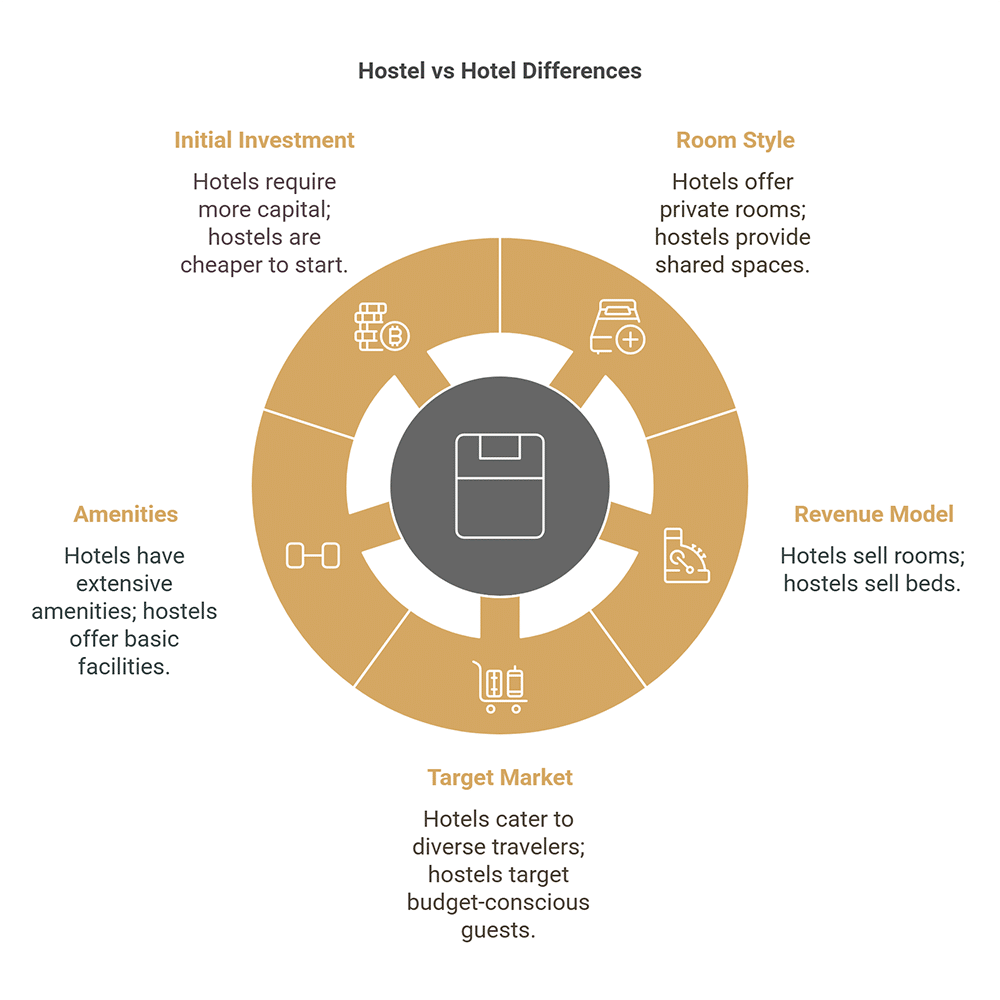
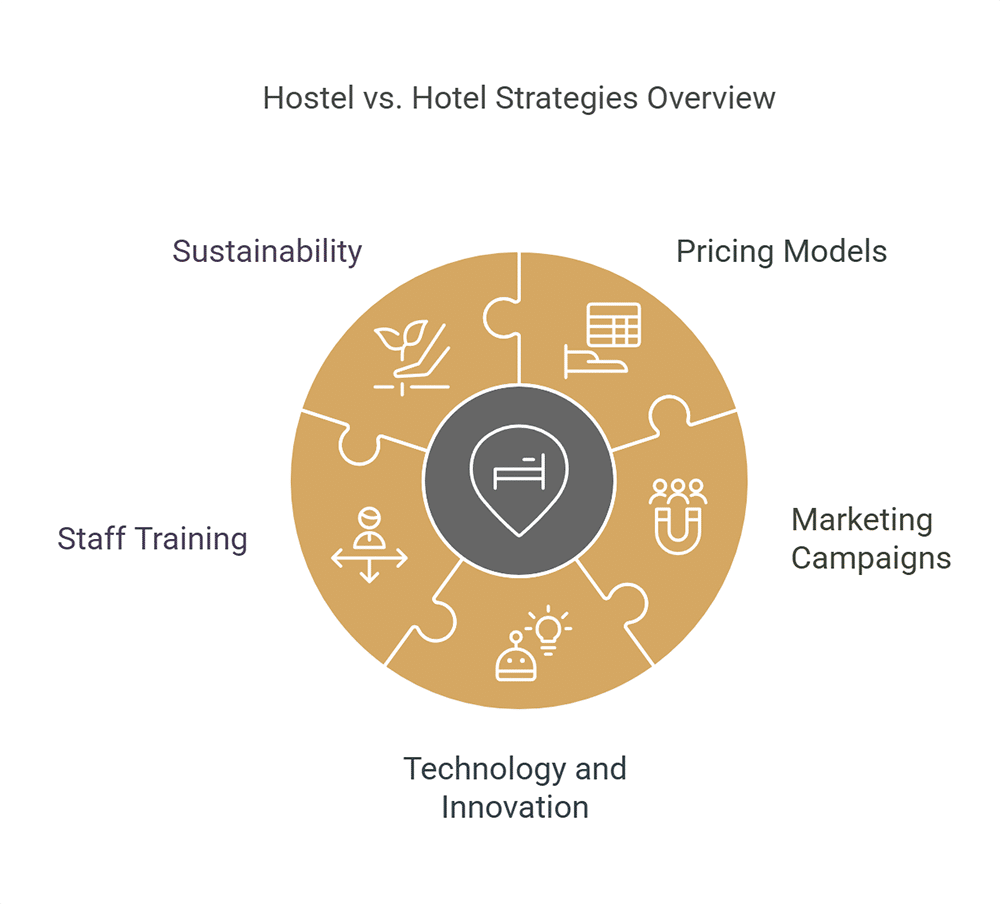
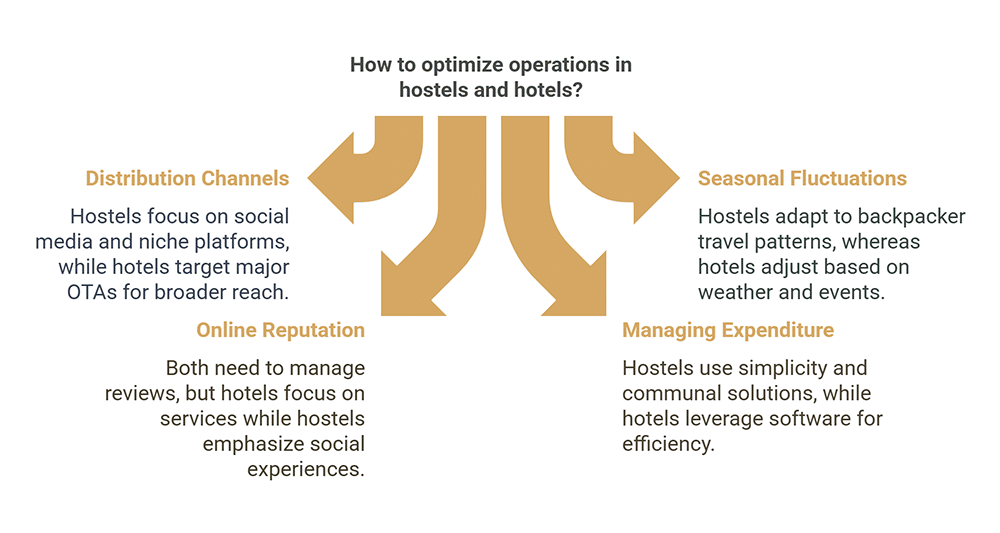


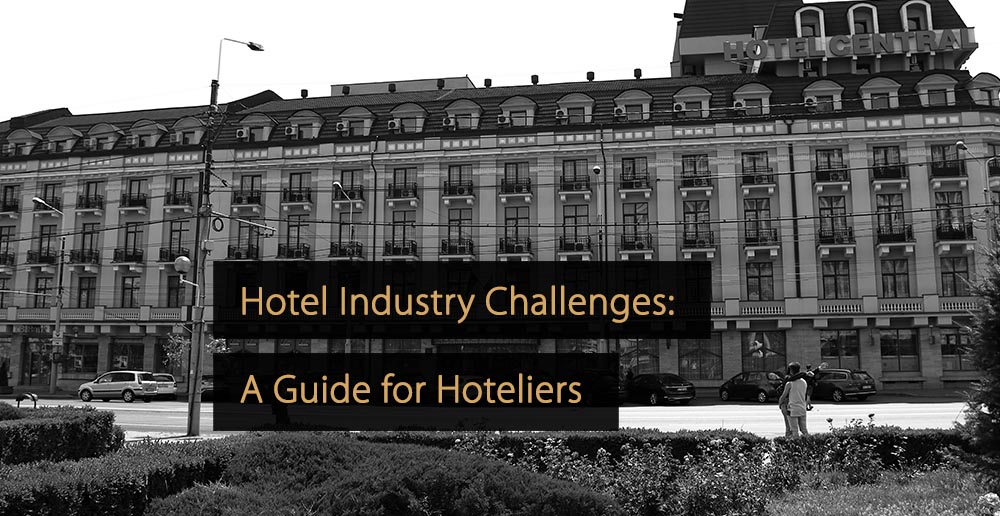

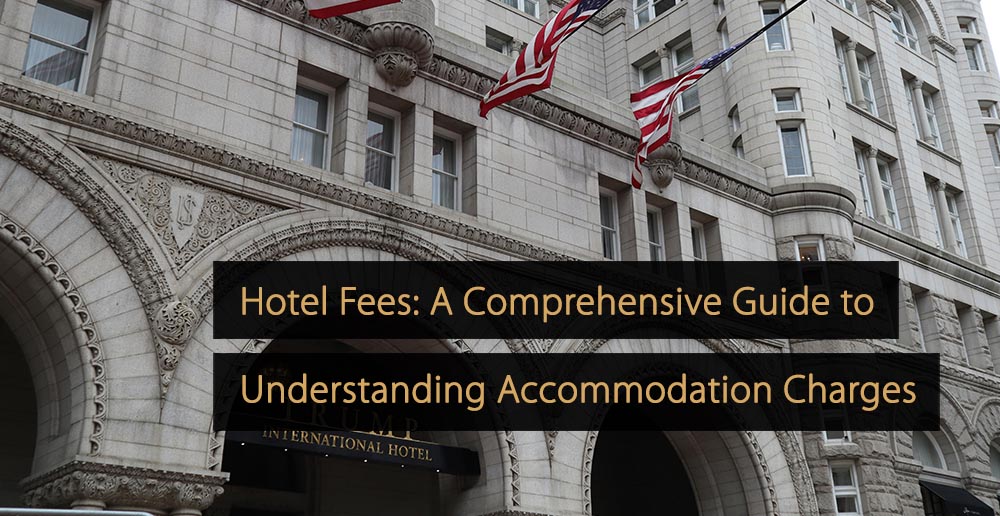

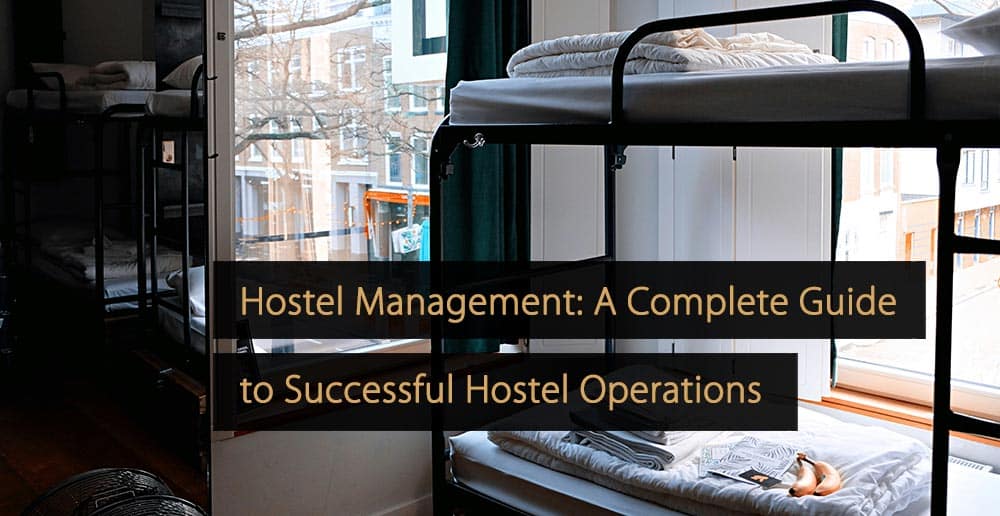
Leave A Comment